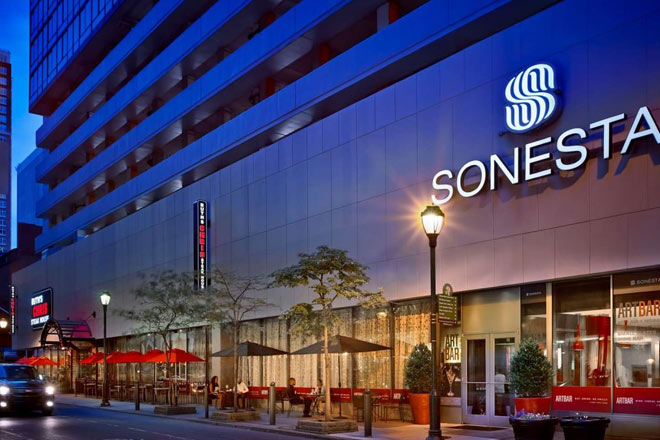Failed deals between a Boston real estate owner and Marriott and IHG as well as the Red Lion parent company acquisition gave Sonesta an early leg up in its growth ambition. Now comes the hard part: organic growth.
One of the fastest-growing hotel companies in the U.S. now has a tool to expand even further.
Sonesta International Hotels Corp. debuted Tuesday its Sonesta Franchising platform, a growth vehicle that will enable the company to franchise in the U.S. four of its brands: Sonesta Hotels & Resorts, Sonesta ES Suites, Sonesta Select, and Sonesta Simply Suites. The ability to franchise was one of the driving factors behind Sonesta’s $90 million RLH Corp. acquisition earlier this year.
Boston-based Sonesta’s acquisition of the company behind brands like Red Lion Hotels and GuestHouse Extended Stay fueled its 1,400-percent growth from the roughly 80-hotel portfolio it had in August 2020. The combined company now has around 1,200 franchised and managed hotels. This latest development opens the door for many more.
“There has been a lot of consolidation in the hospitality business. Obviously, [there was] one big one and a lot of other competitors that have bought brands here and there. The development community and the owner community really wanted a new entrant and a new brand family,” Brian Quinn, chief development officer at Sonesta, said in an exclusive interview with Skift prior to the franchising debut. “It’s really exciting to meet that need.”
Marriott International owns less than 20 of its roughly 7,800 hotels. But Sonesta’s minority owner and capital partner Service Properties Trust, or SVC — a Boston-based lodging trust with a 34 percent stake in the hotel company — owns a significant part of the real estate from its nearly 300-hotel, pre-RLH acquisition Sonesta portfolio.
That more intimate relationship with hotel ownership gives the company a leg up in understanding the ire of capital expenses and other brand standards passed down from hotel parent companies, Sonesta’s thinking goes.
New brand standards, which can include things like costly upgrades with new signage or furniture, often get pushback from franchisees who say they don’t generate much return on investment. Quinn believes the franchisor and franchisee relationship done right is the most significant partnership in business.
“We understand all the challenges that they went through around CapEx and renovation and now talent and managing conflicting demands around cancellation fee flexibility but maximizing revenues,” Quinn said. “We do that every day, and I just think that that will make us a better franchisor and continue to be mindful of that part of the relationship going forward.”
Asset-Right Over Light
The RLH acquisition opened a path for Sonesta to get into franchising in the U.S. RLH was already years into a push to go asset-light, where the company didn’t own much of its hotel real estate and instead franchised out brand licenses to individual owners. This is a general hotel industry trend that affords hotel companies the ability to grow faster and generally operate better in economic downturns.
Even major hotel companies like Marriott and Hilton, both with major business travel-oriented properties in their portfolio, snapped back to greater profits this year faster than the lodging trusts that owned the hotels. But Sonesta and SVC leaders aren’t planning on entirely giving up their real estate holdings.
Given SVC’s lodging trust purpose to own hospitality real estate, Sonesta expects to hold onto assets in major U.S. cities like Boston, Los Angeles, New Orleans, and Chicago. Its high-end Royal Sonesta brand isn’t currently on the franchising list, either. Franchising will help significantly beef up a spoke network of hotels outside major markets.
“A lot of our competitors have gone to an asset-light model,” Quinn said. “We may be a little asset-heavy, but we like to say we’re going to get asset just-right.”
Each of the four brands Sonesta will franchise caters to a different segment of the market. Sonesta Hotels & Resorts offers more personalized guest experiences in a mix of urban and leisure markets. Sonesta Select properties are described as “community hotels” for travelers on the road while Sonesta ES Suites and Sonesta Simply Suites target the upscale and midscale segments of the extended-stay sector, respectively.
There is usually a workhorse brand or two for franchising among the major hotel companies. For IHG, it is Holiday Inn and Holiday Inn Express. Comfort and Quality are leading brands for Choice Hotels. While Quinn shied away from giving too many specifics on developer interest, he did indicate there is an expectation the extended stay brands as well as Sonesta Select will garner a lot of attention.
Sonesta Select has enough of a limited service offering that it isn’t as expensive to run as a full-service property with costly amenities like a spa. But the brand retains features like a fitness center, made-to-order breakfast, and a bar that make it attractive to a variety of travelers.
“It takes the best of upscale and the best of what we learned about select-service and limited-service and puts it together in the upscale space,” Quinn said. “So, the owner can get a good rate and good flowthrough. It’s pretty amenity-rich but not the full boat.”
One to Watch
Sonesta became the eighth-largest U.S. hotel company essentially overnight through its RLH Corp. acquisition, but the company was already gaining major industry interest from two SVC-cancelled deals with bigger brands.
The company went from less than 100 hotels at the beginning of the pandemic to nearly 300 before the RLH deal closed as a result of IHG and Marriott defaults with SVC. The Red Lion acquisition brought the overall Sonesta footprint to roughly 1,200 hotels and 15 brands.
The larger scale enables stronger purchasing power with respect to everything from vendors to technology providers and online travel agencies. But it also provides another sizeable option for hotel owners to consider rather than the likes of Marriott, Hilton, or IHG.
“I don’t know that I had the sense that there was such a need for that,” Quinn said. “Maybe the pandemic exacerbated that. But you talk to owners, and they’re looking for innovation.”
A new franchisor option that has more near-term experience with owning several hundred hotels through the pandemic rather than just franchising them is a plus. But franchising also boils down to who is doing the best job at the negotiating table.
Marriott may own less than 20 of its hotels, but it also has the largest development pipeline of a major hotel company. That kind of franchise appeal can be chalked up to things like distribution and reservations networks as well as a loyalty program that taps into a global network of properties across a litany of price points.
Don’t rule out Sonesta. Chatter at several hospitality industry events in recent months buzzed around growth of the company, particularly how it was initially fueled at the expense of Marriott and IHG. Now comes the organic growth piece in building out the network.
Quinn, who previously worked in development at companies like IHG and Choice, is widely seen as a catalyst to help Sonesta ramp up expansion at a quick clip. Keith Pierce, named the company’s head of franchise and development earlier this year, spent more than 17 years at Wyndham, which has exploded in recent years with its own franchise and brand growth.
But another catalyst for Sonesta could once again be at the expense of major brands. All the major companies relaxed brand standards during the pandemic to provide franchisees a financial life raft to weather the storm. But many of those companies are expected to reintroduce and reinforce standards by next year.
Too heavy a hand around that reintroduction during the uncertain travel recovery could drive disgruntled hotel owners into the arms of a company with a different approach.
“We need to be rational with the standards that we have, and they need to be rooted in a consumer need that can move the needle,” Quinn said. “If I [as a franchisee] am going to spend money, it better drive revenue. That is what I think plays into the hand of a new entrant.”

